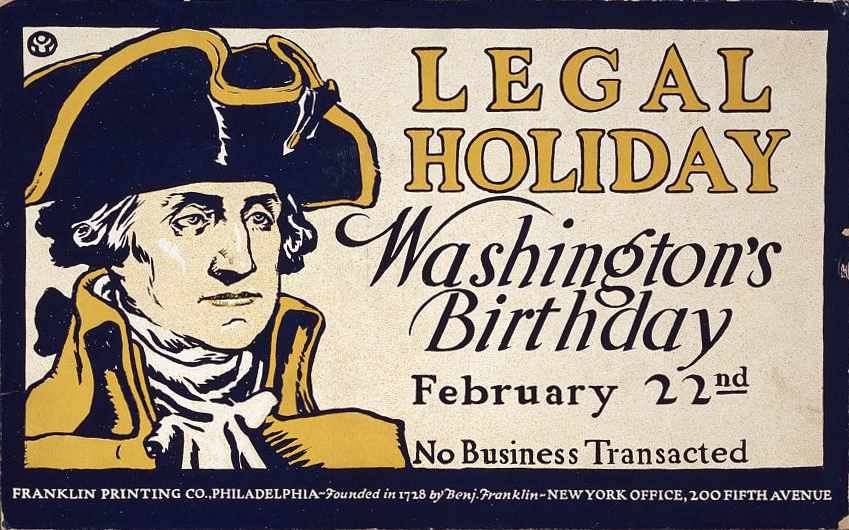The Federal Holiday Celebrated the 3rd Monday in February is "Washington's Birthday"
Edward Penfield, illustrator. Library of Congress's Prints and Photographs division, cph.3g12932.
But if you live in the Metro DC area, keeping track of this holiday's name can be confusing...
- In Virginia, the official state holiday celebrated on the third Monday of February is named George Washington Day.
- In Maryland, they now celebrate the state holiday President's Day on the third Monday, but until 1996, MD celebrated Lincoln's birthday on Feb. 12 and Washington's Birthday on the third Monday of February.
- In Washington D.C., the Human Resources Department matches the federal holiday and marks the third Monday of February as Washington's Birthday (pdf p.14).
- The United States Office of Personell Management (Federal Government) marks the third Monday of February as Washington's Birthday.
While "Lincoln's Birthday" is a separate holiday in some states, and "Presidents Day" is the name of the holiday in other states (although no one agrees on the punctuation), the term "Presidents Day" was never adopted as the name of the federal holiday.
From the Encyclopaedia Britannica:
Presidents Day: In the United States, [a holiday] (third Monday in February) popularly recognized as honouring George Washington and Abraham Lincoln. The day is sometimes understood as a celebration of the birthdays and lives of all U.S. presidents.
The origin of Presidents’ Day lies in the 1880s, when the birthday of Washington—commander of the Continental Army during the American Revolution and the first president of the United States—was first celebrated as a federal holiday. In 1968 Congress passed the Uniform Monday Holiday Bill, which moved a number of federal holidays to Mondays. The change was designed to schedule certain holidays so that workers had a number of long weekends throughout the year, but it has been opposed by those who believe that those holidays should be celebrated on the dates they actually commemorate.
During debate on the bill, it was proposed that Washington’s Birthday be renamed Presidents’ Day to honour the birthdays of both Washington (February 22) and Lincoln (February 12); although Lincoln’s birthday was celebrated in many states, it was never an official federal holiday. Following much discussion, Congress rejected the name change.
After the bill went into effect in 1971, however, Presidents’ Day became the commonly accepted name, due in part to retailers’ use of that name to promote sales and the holiday’s proximity to Lincoln’s birthday. Presidents’ Day is usually marked by public ceremonies in Washington, D.C., and throughout the country.
"Presidents’ Day." Britannica Academic, Encyclopædia Britannica, 18 Feb. 2011. academic-eb-com.library.access.arlingtonva.us/levels/collegiate/article/Presidents-Day/389228. Accessed 12 Feb. 2018.
[Article originally posted Feb. 9, 2012. Sources checked and citations updated February 12, 2018; February 6, 2019; February 10, 2020]
